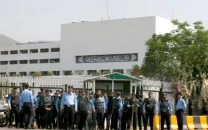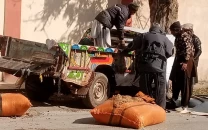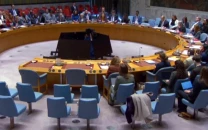Standing up to corruption
Corruption threatens Pakistan’s sovereignty, reducing us to a satellite-status state of the US.

The type of corruption present in Pakistan can be classified into three types. First, there is one which destroys the system of merit because most people who are hired for public sector organisations tend to be hired for other reasons. Second, there is corruption through which Pakistan’s precious natural resources are misused. This happens often when large infrastructure projects are made. The third relates to procurement — when money is paid to other parties to secure deals. This can be found in the sugar, wheat and rental power sectors, or the Hajj scandal; in the purchase of medicines for dengue fever patients or in the mismanagement of flood relief aid.
The Public Accounts Committee of the National Assembly is making some ground to uncover the dirt. The basic accountability process, however, needs to start from parliament itself. If corruption could be detected and checked, then perhaps tax-paying citizens wouldn’t have to be burdened with even more taxes. The ongoing fiasco surrounding the reformed GST fiasco which has rocked parliament is one such example of this. It is clear that overburdening those already in the tax net should not be an acceptable policy tool. With increasing interest rates and a faltering financial system, it is clear that the only remedy left is a clean-up operation of corruption. But that is only possible when there is a will.
The answer then lies in public pressure groups on each corruption case that is highlighted in the media. Almost like an anti-corruption brigade that doesn’t rest till some satisfactory action is taken. I propose that the most damaging cases should be highlighted and affirmative pressure groups be formed, with participation from each political party.
Certain reports of the potential of natural resources need to come to the public domain as well. Only then the loss that Pakistan is suffering, as a result of corruption in infrastructure projects, will be clear. Similarly, the opportunity loss of not having merit-based postings in key public-sector organisations needs to be calculated. The underground economy which has been created as a result of bribes needs to be tabulated as well. We can then reach a consensus on how badly Pakistan is being deprived of its true potential.
Published in The Express Tribune, December 2nd, 2010.


















COMMENTS
Comments are moderated and generally will be posted if they are on-topic and not abusive.
For more information, please see our Comments FAQ